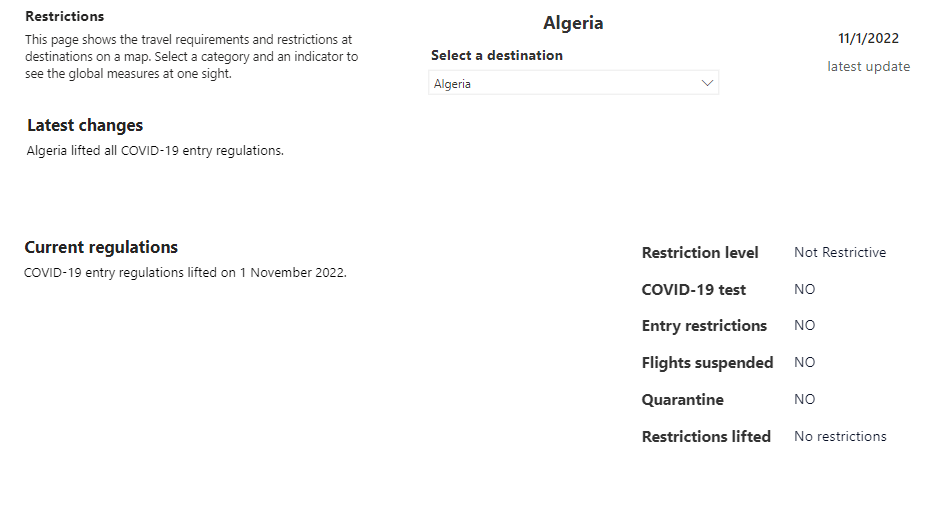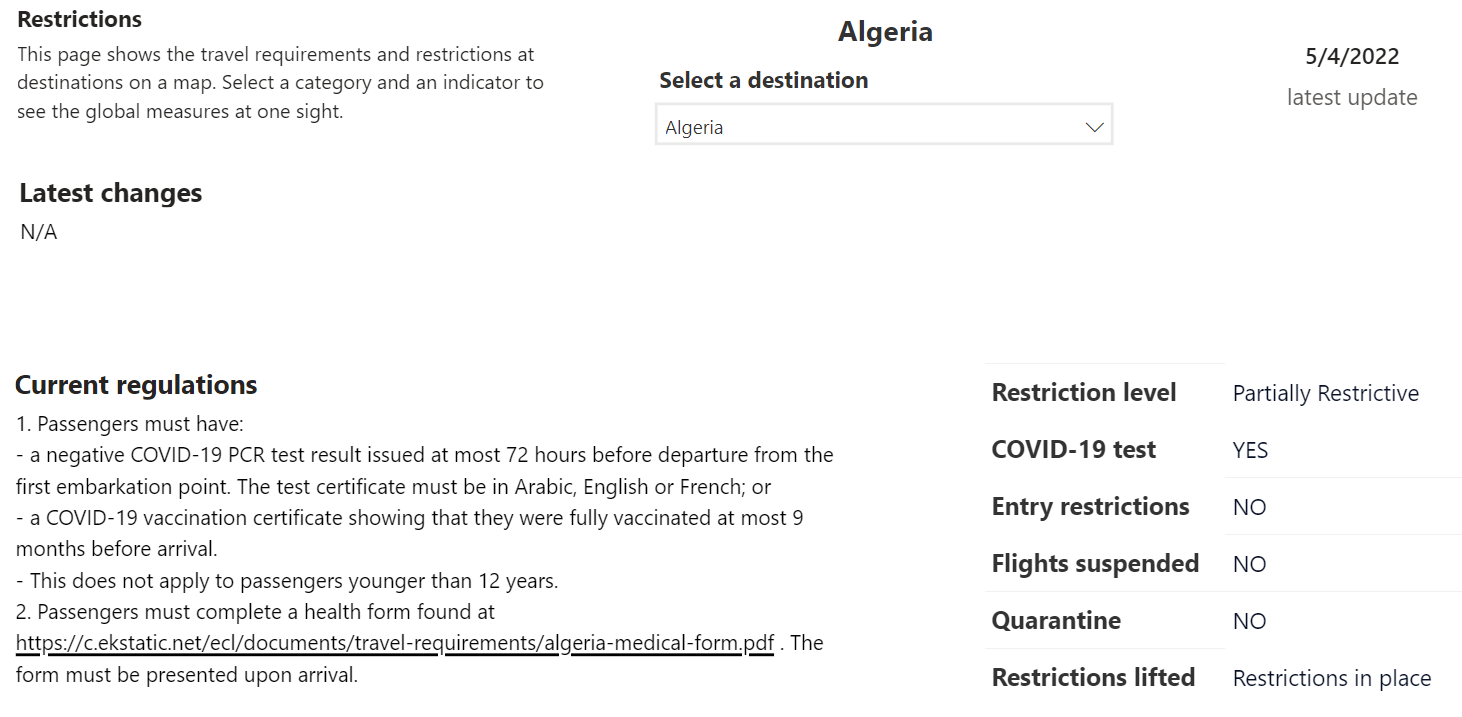| Info | ||
|---|---|---|
| ||
01.11.2022 COVID-19 entry regulations lifted on 1 November 2022. Source: https://www.unwto.org/tourism-data/unwto-iata-destination-tracker-easy-travel _____________________________________________________________________________________________________________________________________- 04.05.2022 Source: https://www.unwto.org/tourism-data/unwto-iata-destination-tracker-easy-travel |
| Info | ||
|---|---|---|
| ||
07.04.2022 *** Effective March 20, 2022, passengers can enter Algeria without restriction if they are fully vaccinated and if their last vaccine is not older than 9 months. Non-vaccinated passengers and those whose vaccinations are older than 9 months must have a negative PCR test within 72 hours of the time of arrival. We recommend that you check with the Algerian authorities on further entry requirements, including vaccination and quarantine. *** Effective January 5, 2022, the Algerian government is requiring all travelers over the age of 18 entering or exiting Algeria to present a “vaccination pass” that proves complete COVID-19 vaccination. Exemptions will be considered on an extremely limited basis. Please contact your nearest embassy or consulate to apply for an exemption. Please visit the CDC webpages for more information about exemptions and the requirement for proof of negative COVID-19 test or recovery from COVID-19 for all air passengers arriving in the United States Country-Specific Information COVID-related preventative measures now in effect include:
Additionally, the “vaccination pass” is required to access public spaces and buildings to include:
The Ministry of Health has advised people to dial 3030 if they suspect they are symptomatic. Visit the website of the Algerian Ministry of Health for updates and its dedicated webpage for additional information on these measures. COVID-19 Testing
COVID-19 Vaccine Information:
Entry and Exit Requirements:
Visa extensions for residents and/or tourists: The Algerian government has instructed the U.S. Embassy to inform citizens in need of Algerian visa extensions to contact their local wilaya Ministry of Foreign Affairs directly (Bureau de la Circulation des Étrangers) to request visa extensions. The U.S. Embassy cannot process these requests. Local Resources: |
| Info | ||||||||||||||||||
|---|---|---|---|---|---|---|---|---|---|---|---|---|---|---|---|---|---|---|
| ||||||||||||||||||
14.01.2021 Décret exécutif n° 21-41 du 30 Joumada El Oula 1442
Source: https://www.douane.gov.dz/IMG/pdf/pagefdecret_executif_no_21-41_.pdf.pdf 03.04.2020 Mesures exceptionnelles"
Source: https://douane.gov.dz/IMG/pdf/avis_mesures_exceptionnelles_03_04_2020.pdf ____________________________________________________________________ 21.03.2020 Décret exécutif n° 20-69 du 26 Rajab 1441 correspondant au 21 mars 2020 relatif aux mesures de prévention et de lutte contre la propagation du Coronavirus (COVID-19).
Source : https://douane.gov.dz/IMG/pdf/decret_executif_no20-69_du_21_mars_2020_covid_19.pdf |
| Info | ||||||||||||
|---|---|---|---|---|---|---|---|---|---|---|---|---|
| ||||||||||||
21.01.2021 Updates from : Ministère de la Santé, de la Population et de la Réforme Hospitalière
|
| Info | ||||||||||||
|---|---|---|---|---|---|---|---|---|---|---|---|---|
| ||||||||||||
30.04.2020 1. Measures to facilitate the cross-border movement of relief consignments and 1.1. In the Customs’ Information System, the green and orange circuit has been allocated to the import of medical supplies as part of the campaign against COVID-19. 1.2. A special Customs clearance procedure for essential goods and medicines has been set up. 1.3. Customs maintains a risk management and anti-fraud system (seizure of medical devices, 1.4. Goods imported as donations by humanitarian associations are duty- and tax-exempt. 1.5. Customers have access to simplified Customs clearance procedures subject to producing a 2. Measures to support the economy and ensure supply chain continuity 2.1. Exports of staple foodstuffs have been stopped. 2.2. The exporting of medical devices is banned. 3. Measures to ensure protection for Customs Administration personnel 3.1. All officers who are exposed to passengers, the general public and goods are supplied with the means to protect themselves (gloves, protective masks, alcohol-based hand-sanitizer and non-contact infrared forehead thermometers). 3.2. All other officers are supplied with alcohol-based hand-sanitizer. 3.3. Periodical workplace disinfection campaigns are planned. 3.4. Strict social-distancing measures have been imposed (particularly in canteens and in offices to which members of the public are admitted). 3.5. All spaces where people ordinarily gather are closed (prayer room, cafeteria, lift). 3.6. All meetings that are not considered a priority have been postponed, and necessary meetings have been shortened, with those attending required to keep the prescribed distance from each other. 3.7. Only officers whose presence is necessary shall be physically present at work, and 3.8. All officers returning from missions abroad and all officers who have been in contact with a person suffering from COVID-19 (particularly someone close to them) must be placed in 3.9. Extensive awareness-raising campaigns aimed at Customs officers have been launched on 3.10. The following stages in Customs investigations have been deferred: Urgent and special investigations are, of course, still being taken on. 3.11. Customs activities involving groups of people (auctions, sporting activities) have been 4. Measures to ensure protection for the public 4.1. A section on the fight against the spread of COVID-19 has been put online on the Algerian 5. Other measures 5.1. Customs is to be represented on the National Commission responsible for establishing 5.2. A Central Standing Committee to Prevent, Monitor and Control the Spread of COVID-19 has been set up in the Directorate General of Customs. 5.4. Round-the-clock shifts have been started, staffed by Customs officers and tasked with passing on all useful information about the spread of COVID-19 and measures which have been adopted or urgently need to be adopted. 5.5. Customs transit documents issued to non-residents are automatically extended until normal conditions are restored, the present situation being regarded as a case of force majeure. 5.6. Vehicles imported under TPD in the context of emergency removal of nationals are accepted for processing, the present situation being regarded as a case of force majeure. 5.7. ATA carnets are cleared in cases of force majeure. 5.8. The Customs procedures with economic impact referred to in Articles 180, 181, 182 and 193 of the Algerian Customs Code are followed in cases of force majeure.
|
| Note | ||||
|---|---|---|---|---|
| ||||
Forthcoming |

